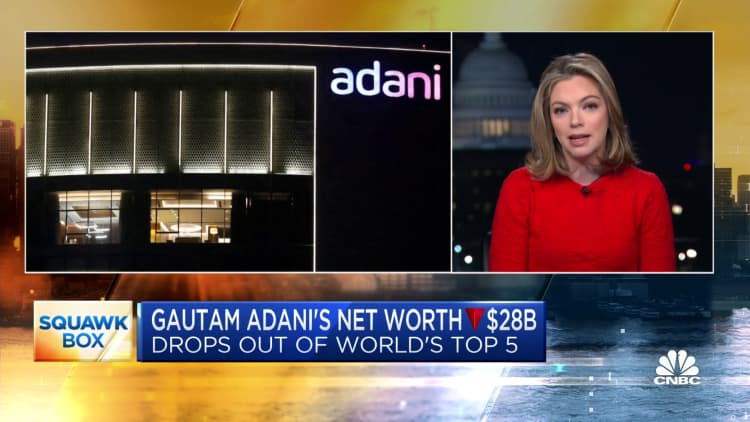Gautam Adani, chairman of Adani Group.
Bloomberg | Bloomberg | Getty Images
While Gautam Adani received a vote of confidence from investors in his latest $2.5 public offering Tuesday, Wall Street is still sizing up his exposure to the global financial sector.
As Adani’s empire has grown, his group has established new relationships with foreign banks. At the same time, it’s reduced the share of Indian banks in its borrowing figures — from 86% in fiscal 2016 to 33% in 2022, according to analysts.
Indeed, Indian banks make up 0.6% of the group’s sector loans, according to JPMorgan. This may seem low but the total exposure to the Adani Group is still around $9 billion, wrote Saurabh Kumar, an analyst at JPMorgan.
“While Adani’s boatloads of debt is not new news, the Hindenburg report has pushed investors to reexamine the Indian billionaire’s relationship with banks,” said Ravi Ahuja, a professor at DeSales University, to CNBC.
Activist investor Bill Ackman, founder of hedge fund Pershing Square, tweeted Sunday: “There is just too much liability exposure for the banks.” Ackman was refencing this week’s share sale for its flagship Adani Enterprises, which crucially achieved a full subscription Tuesday.
A spokesperson for the Adani Group was not immediately available for comment when contacted by CNBC.
Outside help?
Jefferies analyst Prakhar Sharma writes that, for now, the risk to Indian banks is low, saying, “we don’t see material risk to the Indian banking sector.”
Indian banks with exposure to the Adani Group include the State Bank of India, Life Insurance Corp., Union Bank of India, ICICI and Axis as well as others.
“We’re not expecting a run on the banks, but if the situation gets worse, outside help will be needed,” said one official at an Indian state-run bank, who preferred to remain anonymous due to the sensitivity of the topic, to CNBC.
While Adani’s reliance on Indian banks has fallen over time, the capital used to launch new infrastructure projects funded by foreign banks has risen dramatically — from zero to 18% of its total debt in the last six years, according to Jefferies’ India team.

“Most of the incremental funding to the group for new businesses and acquisitions has come via overseas sources,” according to Adarsh Parasrampuria, an analyst at investment group CLSA.
That includes one of Adani’s most recent deals to acquire the cement business of Switzerland’s Holcim for $10.6 billion in mid-2022. The deal was underwritten by Barclays, Deutsche Bank, Standard Chartered and Mizuho, as well as other international banks.
Private equity has also played a prominent role. In 2021, Warburg Pincus paid more than $100 million to purchase a small stake in Adani Ports and Special Economic Zones Ltd. A spokesperson for Warburg Pincus was not immediately available for comment.
Last year, Apollo’s credit fund provided a $750 million loan to the Mumbai International Airport, a public-private partnership between Adani Airport Holdings Ltd. (74% ownership) and Airports Authority of India (26% of ownership). A spokesperson for Apollo was not immediately available for comment when contacted by CNBC.
Outside of banks, existing investor Abu Dhabi’s International Holding Co. announced plans on Monday to invest $381 million in Adani’s conglomerate, though did not reveal at what valuation.
In a company release, IHC CEO Syed Basar Shueb, who is also an investor in SpaceX, said, “Our interest in Adani Group is driven by our confidence and believe in the fundamentals of Adani Enterprises Ltd; we see a strong potential for growth from a long-term perspective and added value to our shareholders.”
Abu Dhabi’s investment along with the oversubscribed $2.5 public offering halted the downward decline in Adani Group’s stocks on Tuesday.
Of the seven companies operated by the Adani Group: Adani Green Energy, Adani Power and Adani Ports are sitting on the most net debt, according to analysts.
“If the share price fall doesn’t stop, Adani may need look at financing options, including conversations with investors in the Middle East that are eager to diversify,” said a banker in Mumbai, India, who also preferred to remain anonymous due to the sensitivity of the topic, to CNBC.
Hindenburg allegations
In a 413-page report Sunday, Adani attacked short seller Hindenburg and its allegations of fraud and stock price manipulation. In an attempt to stroke nationalist fervor, Adani went on to argue that Hindenburg’s assessment is a “calculated attack on India.”
Hindenburg on Monday morning described the group’s response as “bloated” and claimed it “ignores every key allegation” against the conglomerate that it raised.
Gautam Adani, the richest person in Asia and once second only to Elon Musk, fell out of the world’s top 10 richest to 11th place on the Bloomberg’s Billionaires Index, as of Monday’s close.
— CNBC’s Jihye Lee contributed to this article.





